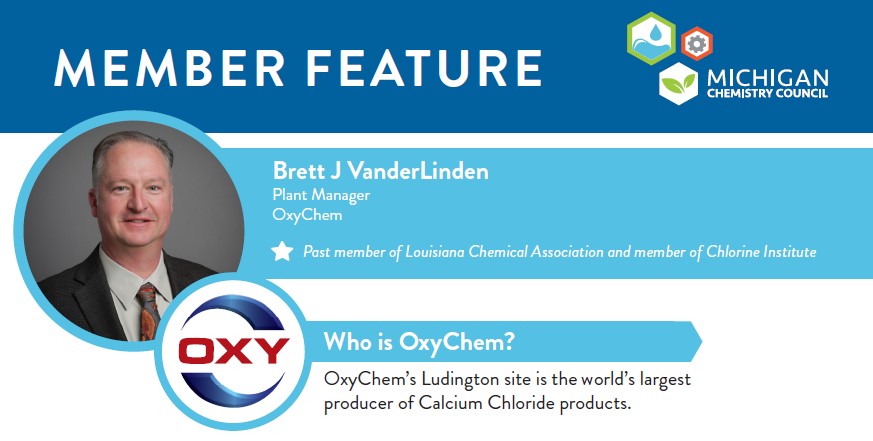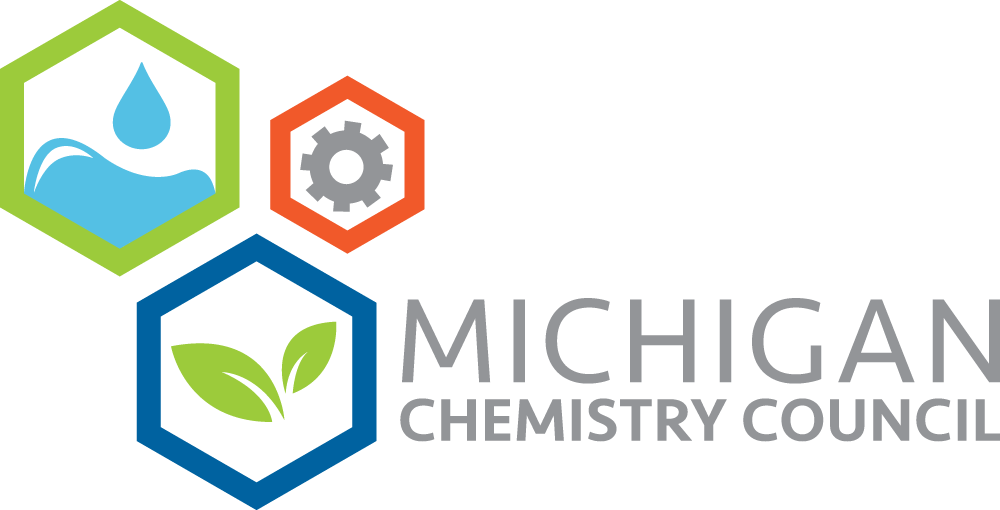
Download Feature Here
Who is OxyChem?
OxyChem’s Ludington site is the world’s largest producer of Calcium Chloride products.
More About You
What are some of the products that your chemistry enables?
Calcium chloride (CaCl2) from OxyChem is a specialty salt with unique properties that are used to improve driving and pedestrian safety, remove unhealthy dust from the air we breathe, and enhance the performance of products and processes that contribute to the supply of energy, food, and other essentials of life.
Specific products include ice melters, dust suppressants, brining, preservation, pre- and post-harvest food processing additives in food such as pickles, cherries, beer, cheese, etc., hydrocarbon dehydration agents, drilling and completion fluids, concrete accelerators, and others depending on the unique application.
What is something you want others to know about chemistry?
The thoughtful production and use of indispensable chemicals is fundamental to life for billions of people around the world.
What led you to your current career field?
I have always been interested in chemistry. It was only natural for me to become a Chemical Engineer and to practice it on a larger scale.
What job would you have if you weren’t doing this?
If I wasn’t blessed to be doing what I do now, I would have considered something within the Naval Architecture field.
What do you like most about living in Michigan or your community?
I have only been in Michigan since March of 2021, but I have really enjoyed experiencing all four seasons of a year. The fall colors were magnificent, and now the accumulation of snow that we did not get in Louisiana is spectacular. However, the best part of living here so far has been getting to work and interact with terrific people at our plant and in the community.
How do you think your job will be most different in 10 years?
The work we do is essential, but I think the business will be increasingly challenged by an ever-evolving -- and sometimes counter-productive -- regulatory and political environment.
Why do you work with industry groups like the MCC?
MCC provides a great opportunity for engagement with others in our industry and helps communicate and guide the legislation that affects us.
Feature Questions
What is the brief history of the Ludington plant and the chemistries it has produced?
The Ludington plant was built in 1942 by the U.S. Defense Plant Corp., to produce magnesium chloride as a feedstock to manufacture magnesium for the war effort. The plant produced MgCl2 for about a year prior to being shut down at the end of WWII. The Dow Chemical Company then purchased the plant and extracted brine from the Filer formation to produce Bromine, Calcium Chloride, Magnesium Hydroxide and Magnesium Chloride. In 2003, Dow exited magnesium hydroxide production, and a joint venture was established with Martin Marietta. Martin Marietta, located in Manistee, Michigan, extracts and processes brine to manufacture Mg(OH)2 and they ship to the Ludington plant, via pipeline, the unused calcium chloride brine where it is then processed into commercial grades of liquid, flake, and pellet calcium chloride. OxyChem purchased the Ludington calcium chloride business from Dow in 2009.
How does Michigan geology contribute to Oxy’s process?
The brine that we use comes specifically from the calcium-rich sandstone of the Filer formation located beneath the ground of Western Michigan.
How is calcium chloride a natural wonder product?
Calcium chloride contributes three unique and highly valuable performance properties:
- It is hygroscopic, strongly attracting moisture from its surroundings.
- Solid calcium chloride is deliquescent, meaning it can absorb enough moisture to convert to liquid brine.
- When in contact with moisture, solid calcium chloride releases heat in an exothermic reaction.
The ability of CaCl2 to attract water makes it a highly effective dust suppressant when applied to the surface of gravel roads. It is also an effective stabilizing agent in gravel road bases and in mixtures of road base gravel and pulverized asphalt created during the full-depth reclamation process. In these applications, calcium chloride attracts moisture from the air (and retains moisture applied during construction and maintenance operations) to bind fine and coarse gravel particles together, preventing road degradation.
The hygroscopic, deliquescent and exothermic properties of calcium chloride are highly beneficial in quickly melting ice on sidewalks and steps. Ice melter speed of action is determined by how easily it dissolves when exposed to snow or ice to form a brine solution. This brine lowers the freezing point of water to melt additional snow and ice on contact. By attracting moisture from its surroundings, CaCl2 speeds up the creation of brine.
How does Oxy contribute to the local community?
Aside from the taxes paid, jobs created and economic impact generated, OxyChem contributes to the community through numerous financial donations and volunteer activities.
The company and its employees are deeply engaged in enhancing quality of life in our community, supporting our neighbors and protecting our environment. This includes volunteer hours each year for the Alzheimer’s Association and Habitat for Humanity as well as ongoing financial contributions to the United Way, Lakeshore Food Club, Friends of the Ludington State Park and other Ludington-focused non-profit organizations.

